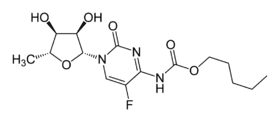All AbMole products are for research use only, cannot be used for human consumption.

Capecitabine is a novel oral fluoropyrimidine carbamate. Capecitabine is a precursor, that is enzymatically converted to 5-fluorouracil in the tumor, where it inhibits DNA synthesis and slows growth of tumor tissue. Capecitabine may inhibit cytochrome CYP2C9 enzyme, and therefore increase levels of substrates such as phenytoin and other substrates of CYP2C9. Capecitabine has shown varying degrees of efficacy with acceptable tolerability in numerous cancers including prostate, renal cell, ovarian, and pancreatic, with the largest amount of evidence in metastatic breast and colorectal cancer. After oral administration of 1250 mg/m2, capecitabine is rapidly and extensively absorbed from the gastrointestinal tract [with a time to reach peak concentration (tmax) of 2 hours and peak plasma compound concentration (Cmax) of 3 to 4 mg/L] and has a relatively short elimination half-life (t(1/2)) [0.55 to 0.89 h].

Environ Pollut. 2023 Jan 11;320:121068.
Exposure to polystyrene microplastics triggers lung injury via targeting toll-like receptor 2 and activation of the NF-κB signal in mice
Capecitabine purchased from AbMole
| Molecular Weight | 359.35 |
| Formula | C15H22FN3O6 |
| CAS Number | 154361-50-9 |
| Solubility (25°C) | DMSO 72 mg/mL Water 10 mg/mL |
| Storage |
Powder -20°C 3 years ; 4°C 2 years In solvent -80°C 6 months ; -20°C 1 month |
[1] Walko CM, et al. Clin Ther. Capecitabine: a review.
[2] Reigner B, et al. Clin Pharmacokinet. Clinical pharmacokinetics of capecitabine.
| Related DNA/RNA Synthesis Products |
|---|
| Deoxyribonucleic Acid (from Salmon sperm)
Deoxyribonucleic Acid (from Salmon sperm) can be used as a research reagent, widely used in molecular biology, pharmacology and other scientific research. |
| GSK4418959
GSK4418959 (IDE275) is a non-covalent, reversible, selective and orally active WRN helicase inhibitor. GSK4418959 inhibits ATPase and DNA unwinding functions in an ATP-competitive manner. |
| Dencatistat
Dencatistat (P115) is an inhibitor of Cytidine Triphosphate Synthase 1 (CTPS1) with an IC50 value of ≤ 0.1 μM. |
| Antipain dihydrochloride
Antipain dihydrochloride is a protease inhibitor. Antipain dihydrochloride inhibits N-methyl-N'-nitro-N-nitrosoguanidine (MNNG)-induced transformation and increases chromosomal aberrations. Antipain dihydrochloride also restricts uterine DNA synthesis and function in mice. |
| Tetrahydrouridine
Tetrahydrouridine (THU) is potent inhibitor of cytidine deaminase (CDA), which competitively blocks the enzyme's active site more effectively than intrinsic cytidine. |
All AbMole products are for research use only, cannot be used for human consumption or veterinary use. We do not provide products or services to individuals. Please comply with the intended use and do not use AbMole products for any other purpose.


Products are for research use only. Not for human use. We do not sell to patients.
© Copyright 2010-2024 AbMole BioScience. All Rights Reserved.
